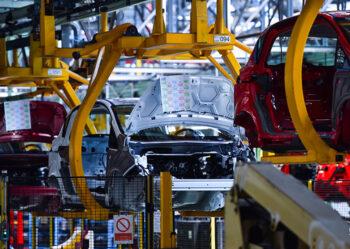The French and the autonomous vehicle

The autonomous vehicle is becoming more and more important in our society today.
It is a technology that is constantly progressing and could eventually become part of our daily lives.
However, as with any innovation, there can be many questions. A survey conducted by Macif and the Vedecom Institute in 2021 (the first being in 2020) indicates that 73% of French people have a positive attitude towards this mode of transport, a figure that is 3 points higher than in 2020.
What is the autonomous vehicle, its stakes and why ¾ of the French would be tempted by automated vehicles and ADAS technology, this is what we will try to discover together today.
The autonomous vehicle : definition
Before getting to the heart of the matter, let us briefly recall what autonomous vehicle technology is all about.
The autonomous vehicle is another name for the automated vehicle and consists of offering an innovative and eco-responsible solution in a context of environmental preservation and improved mobility.
It consists of a number of assistance technologies that allow a certain number of driving-related functions to be automated, sometimes even without the need for a driver on board.
The autonomous vehicle is equipped with computer software that will act as an artificial intelligence. This will analyse the road and allow the vehicle to act according to the situation it is faced with.
The technological innovations include sensors, radar, reversing cameras, DTS, ISA and many other technologies that will allow for smoother, more precise, safer and more responsible driving.
But what do the French think of this technology?
French people’s knowledge of the autonomous vehicle
Knowledge of the autonomous vehicle is still to be perfected in France. Indeed, the vast majority of people questioned have never used (97%) or seen an autonomous vehicle (88%).
However, according to a recent study by Macif and the Vedecom Institute, the latter would feel much more concerned by autonomous vehicles if they were to see or use one.
12% of people living in rural areas have already seen an automated vehicle, an increase of 4 points compared to 2020, although this figure remains relatively low.
The visibility of autonomous vehicles is higher among young people, city dwellers and managers: 4% of 18-24 year old have already seen an automated vehicle (+6 points), 23% of city dwellers (+7 points) and 22% of managers (+4 points).
Growing French interest in autonomous vehicles
The study carried out by Macif and the Vedecom Institute is optimistic. It surveyed a large representative panel (all genders and ages with a varied geographical distribution of over 4,000 people).
More than 73% of respondents showed a positive attitude towards this technology, 3 points more than 2020.
More than 50% of French people would be ready to test the autonomous vehicle in the years to come and 39% even plan to use this mode of transport regularly.
Approximately 5% of French people surveyed have had the opportunity to use an autonomous vehicle this year (2 points more than in 2020).
French motivations for the use of autonomous vehicles
Since 73% of them have shown an interest in the autonomous vehicle, what are the motivations and what factors could push the French to opt for this type of vehicle in the future?
-
The autonomous vehicle is synonymous with environmental protection
For 63% of respondents, the autonomous vehicle is synonymous with ecology. Indeed, they consider that it would be “greener” than a non-autonomous vehicle. Many French people associate the autonomous vehicle with green energy.
-
The autonomous vehicle associated with confidence and safety
The other factor that would encourage the French to drive an autonomous vehicle is the safety that it can provide. Nearly 6 out of 10 French people believe that they would feel safe in this mode of travel and more than 50% of respondents say that they consider it to be reliable.
-
The autonomous vehicle provides well-being
The French may also be attracted to the autonomous vehicle because they believe that it will provide them with more well-being than a conventional vehicle. Its autonomous and automated aspect effectively allows for simpler and smoother driving, which improves the feeling of well-being and reduces fatigue on the road. Indeed, many ADAS technologies allow for a more comfortable and flexible driving experience for drivers.
The reluctance and expectations of the French towards the autonomous vehicle
The autonomous vehicle is not only of interest to the French and many questions remain concerning the safety of autonomous vehicles and even liability.
-
Legal liability
Indeed, what would be the responsibility of a driver on an autonomous vehicle who, in order to avoid bodily injury, would have caused material damage? This question is one of the many questions that are still legally unclear today.
Furthermore, it should be noted that even if the majority of French people associate the autonomous vehicle with a notion of safety, many of them (55%) still prefer a partially automated vehicle, i.e. one that allows them to take control (particularly in critical situations) and to retain a minimum of control while driving.
This proves that a 100% automated vehicle would not be so easy to accept in French society.
-
The notion of accessibility raised
This is both a brake and an expectation of the French: the autonomous vehicle must be accessible to all. This is an essential criterion for the population.
Here, it is not only a question of the use of the vehicle at a strictly personal level but also for regular journeys by public transport, for example.
Indeed, this study has raised the need for autonomous mobility in urban areas. There is now a growing expectation and interest in new modes of travel that are more environmentally friendly and inclusive than individual vehicles (such as autonomous shuttles for example).
Around 65% of French people believe that the autonomous vehicle will improve travel in rural areas and 67% believe that it will end dependence on their personal vehicle.
It should be remembered that the autonomous vehicle represents a real challenge for white or rural areas that are often limited in terms of public transport provision.
Finally, although the French are generally very optimistic about the idea of driving an autonomous vehicle, they nevertheless have certain obstacles and expectations that must be addressed and dealt with.
SNECI supports you in your transition to the autonomous vehicle
Today, many vehicles are partially autonomous and automated, in particular thanks to ADAS systems.
These include safety systems and advanced technologies to support and assist the driver during the journey. They will undoubtedly become an integral part of autonomous vehicles.
SNECI, in partnership with the SIA and the FIEV, is offering training for anyone in the automotive industry involved in the design, manufacture or repair of automotive systems and components.
The course is also suitable for people wishing to understand and support the transition to the autonomous vehicle.
Designed in collaboration with the SIA (Société des Ingénieurs de l’Automobile) and the FIEV, it meets several objectives:
- To identify the technical, economic and societal issues related to the arrival of autonomous vehicles
- Identify the main services provided by ADAS
- To be able to understand and describe the main technological components used to create ADAS as well as their implementation constraints in the vehicle
Delivered by an SIA trainer, this training will enable you to better understand the progressive automation of the main vehicle functions and to familiarize yourself with the technologies of the autonomous vehicle through ADAS systems.
Would you like to know more about this training? Do not hesitate to contact us!





